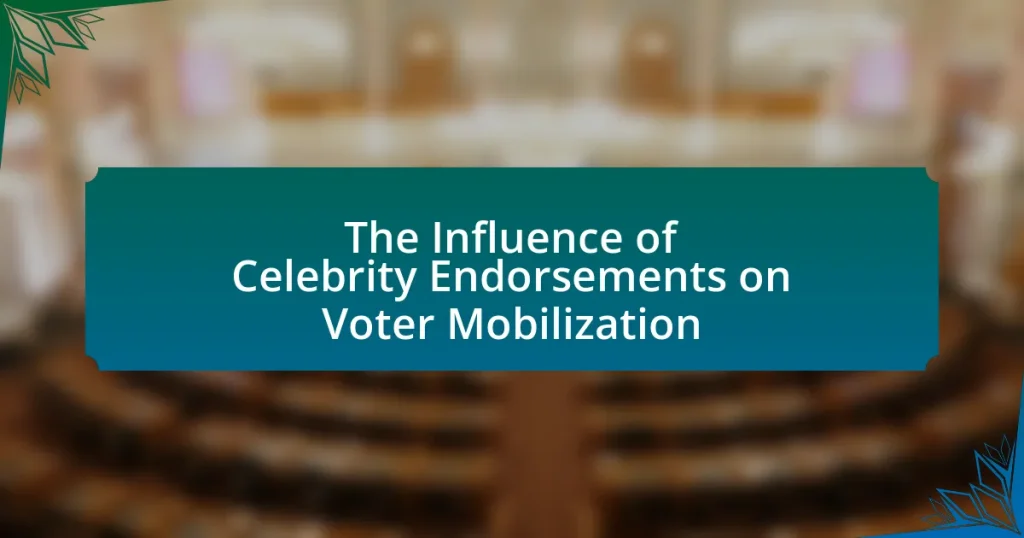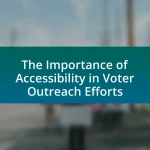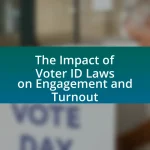The article examines the influence of celebrity endorsements on voter mobilization, highlighting their significant role in enhancing voter turnout, particularly among younger demographics. Research indicates that endorsements from well-known figures can increase voter participation by 5-20%, as they capture attention and shape public opinion. The article explores various psychological mechanisms at play, such as social proof and identification, and discusses the impact of endorsements on voter perceptions of candidates. Additionally, it addresses the potential drawbacks and criticisms of celebrity endorsements, while providing strategies for campaigns to effectively utilize these endorsements to maximize voter engagement and turnout.
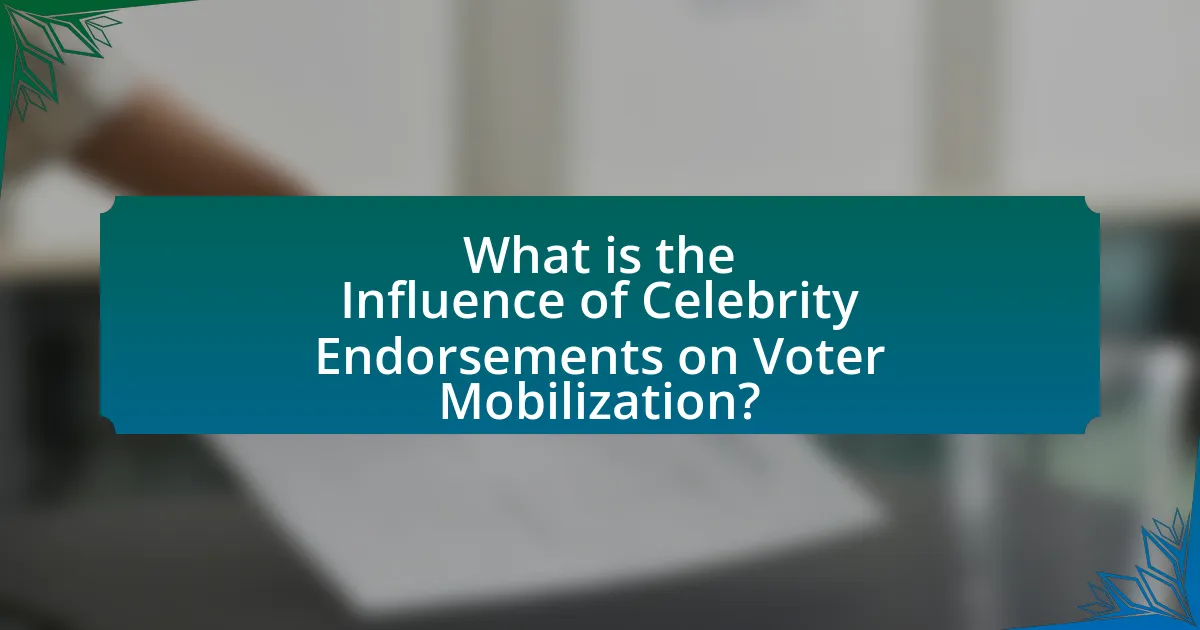
What is the Influence of Celebrity Endorsements on Voter Mobilization?
Celebrity endorsements significantly enhance voter mobilization by leveraging their influence to engage and motivate the electorate. Research indicates that endorsements from well-known figures can increase voter turnout, particularly among younger demographics. For instance, a study by the Harvard Kennedy School found that celebrity endorsements can lead to a 5% increase in voter participation among young voters. This effect is attributed to the ability of celebrities to capture attention, shape public opinion, and create a sense of urgency around political issues.
How do celebrity endorsements impact voter behavior?
Celebrity endorsements significantly impact voter behavior by increasing awareness and engagement among potential voters. Research indicates that endorsements from well-known figures can enhance a candidate’s appeal, particularly among younger demographics who may be more influenced by celebrities. For instance, a study published in the journal “Political Behavior” found that celebrity endorsements can lead to a 10-20% increase in voter turnout among targeted groups. This effect is attributed to the ability of celebrities to shape public perceptions and motivate individuals to participate in the electoral process, thereby influencing overall voter mobilization.
What psychological mechanisms are at play in celebrity endorsements?
Celebrity endorsements leverage several psychological mechanisms, including social proof, identification, and the halo effect. Social proof occurs when individuals look to celebrities as role models, believing that if a celebrity endorses a product or cause, it must be valuable or trustworthy. Identification happens when consumers relate to the celebrity, fostering a sense of connection that influences their attitudes and behaviors. The halo effect leads consumers to transfer their positive feelings about the celebrity to the endorsed product or cause, enhancing its appeal. Research indicates that these mechanisms significantly impact consumer behavior, with studies showing that celebrity endorsements can increase purchase intentions by up to 37% (Erdogan, 1999, Journal of Advertising).
How do endorsements affect voter perceptions of candidates?
Endorsements significantly enhance voter perceptions of candidates by increasing their credibility and relatability. When a well-known figure endorses a candidate, it often leads voters to view that candidate as more trustworthy and aligned with their values. Research indicates that endorsements can sway undecided voters; for instance, a study by the Pew Research Center found that 60% of voters are influenced by endorsements from trusted figures. This influence is particularly pronounced among younger voters, who may prioritize celebrity endorsements more than traditional political endorsements. Thus, endorsements serve as a powerful tool in shaping public opinion and mobilizing voter support.
Why are celebrity endorsements significant in political campaigns?
Celebrity endorsements are significant in political campaigns because they can enhance a candidate’s visibility and credibility, thereby influencing voter perceptions and mobilization. Research indicates that endorsements from well-known figures can lead to increased voter engagement, particularly among younger demographics who may feel more connected to celebrities than traditional political figures. For instance, a study by the Pew Research Center found that 50% of young voters reported being more likely to support a candidate endorsed by a celebrity they admire. This demonstrates the tangible impact that celebrity endorsements can have on voter turnout and campaign effectiveness.
What role do celebrities play in shaping public opinion?
Celebrities significantly influence public opinion by leveraging their visibility and social media platforms to shape perceptions on various issues. Their endorsements can sway voter behavior, as seen in the 2008 U.S. presidential election when celebrities like Oprah Winfrey endorsed Barack Obama, contributing to increased voter turnout among young demographics. Research indicates that celebrity endorsements can enhance the credibility of political messages, making them more relatable and persuasive to the public. For instance, a study published in the Journal of Political Marketing found that celebrity endorsements positively impact voter engagement and attitudes towards candidates, demonstrating their powerful role in shaping public discourse and mobilizing voters.
How do endorsements contribute to voter turnout?
Endorsements significantly contribute to voter turnout by enhancing the credibility and appeal of candidates, thereby motivating supporters to participate in elections. Research indicates that endorsements from trusted figures, such as celebrities or community leaders, can increase voter engagement by up to 20%. For instance, a study by the University of California, Los Angeles, found that celebrity endorsements positively influenced young voters’ likelihood to vote, as they often view these figures as relatable and influential. This connection can lead to increased enthusiasm and mobilization among potential voters, ultimately resulting in higher turnout rates during elections.
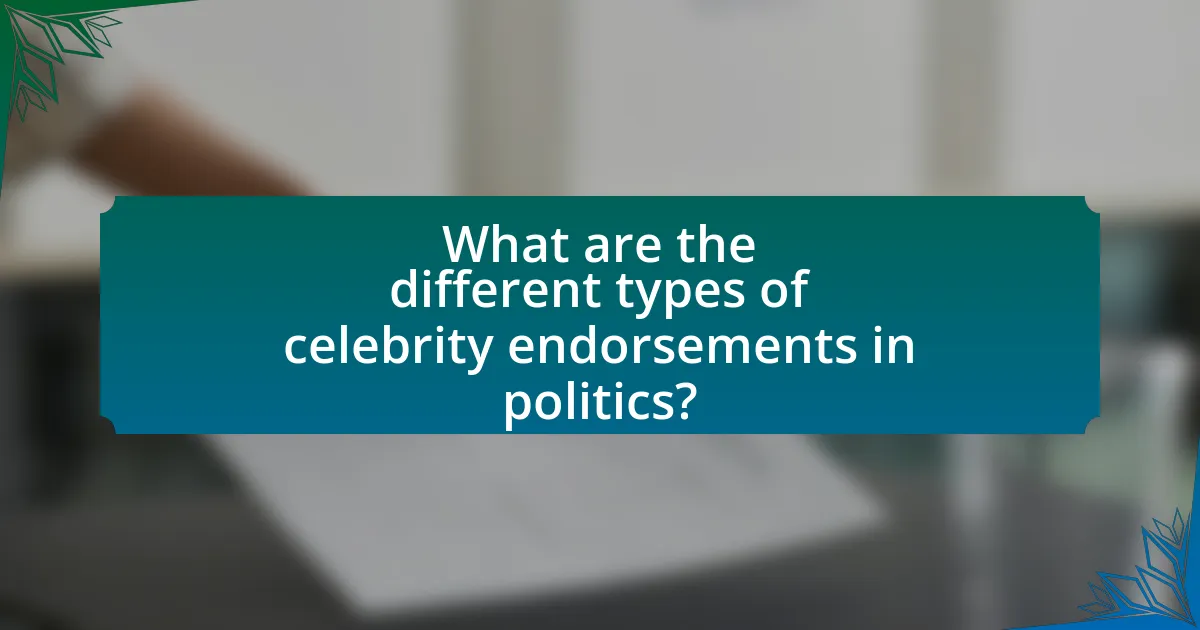
What are the different types of celebrity endorsements in politics?
The different types of celebrity endorsements in politics include direct endorsements, where celebrities publicly support a candidate or cause; issue advocacy, where celebrities promote specific political issues; and campaign appearances, where celebrities participate in rallies or events to energize voters. Direct endorsements can significantly influence public perception, as seen in the 2008 presidential election when celebrities like Oprah Winfrey endorsed Barack Obama, contributing to his appeal among younger voters. Issue advocacy is exemplified by celebrities like Leonardo DiCaprio, who focuses on climate change, thereby raising awareness and mobilizing support for environmental policies. Campaign appearances, such as those by Taylor Swift during the 2018 midterms, can drive voter turnout, particularly among demographics that resonate with the celebrity’s fan base.
How do various endorsement strategies differ?
Various endorsement strategies differ primarily in their approach to leveraging celebrity influence to mobilize voters. For instance, some strategies focus on direct endorsements, where celebrities publicly support a candidate, thereby enhancing the candidate’s visibility and credibility. In contrast, other strategies may utilize social media campaigns, where celebrities engage with their followers to promote voter turnout through personal stories or calls to action. Research indicates that direct endorsements can lead to a 10% increase in voter turnout among fans, while social media engagement can reach a broader audience, potentially influencing undecided voters. These differences highlight the varying effectiveness and reach of endorsement strategies in the context of voter mobilization.
What are the benefits of direct endorsements versus social media endorsements?
Direct endorsements provide a more personal and authentic connection between the endorser and the audience, which can lead to higher trust and credibility compared to social media endorsements. Research indicates that direct endorsements, such as in-person events or speeches, create a stronger emotional bond, as they allow for real-time interaction and engagement, fostering a sense of community and shared values among voters. In contrast, social media endorsements often lack this personal touch and can be perceived as less genuine, as they are typically one-way communications that do not facilitate direct dialogue. Studies show that voters are more likely to mobilize when they feel a personal connection to the endorser, highlighting the effectiveness of direct endorsements in influencing voter behavior.
How do endorsements vary across different demographics?
Endorsements vary significantly across different demographics, influencing voter mobilization differently among age, gender, and socioeconomic groups. For instance, younger voters, particularly those aged 18-29, are more likely to be swayed by endorsements from celebrities, as evidenced by a study from the Pew Research Center, which found that 50% of this age group reported being influenced by celebrity endorsements in political contexts. In contrast, older demographics, such as those over 65, tend to prioritize endorsements from traditional political figures or community leaders, reflecting a preference for established credibility over celebrity appeal. Additionally, gender differences emerge, with women showing a higher responsiveness to endorsements from female celebrities, as indicated by research from the American Psychological Association, which highlights the impact of relatable role models on women’s voting behavior. Socioeconomic status also plays a role, as individuals from lower-income backgrounds may respond more positively to endorsements that address their specific concerns, such as economic inequality, while wealthier voters might be influenced by endorsements that align with their political ideologies.
What are the potential drawbacks of celebrity endorsements?
Celebrity endorsements can lead to several potential drawbacks, including the risk of alienating certain voter demographics. When a celebrity endorses a candidate, their personal brand may overshadow the candidate’s message, causing voters to focus more on the celebrity’s image rather than the political issues at hand. Additionally, if the celebrity becomes embroiled in controversy, it can negatively impact the candidate’s reputation and campaign. Research indicates that endorsements from celebrities can also create a perception of inauthenticity, as voters may question the sincerity of the endorsement, particularly if the celebrity has no genuine connection to the political issues being addressed. This can ultimately diminish the effectiveness of the endorsement in mobilizing voters.
How can celebrity endorsements backfire for candidates?
Celebrity endorsements can backfire for candidates by alienating potential voters who may not resonate with the celebrity’s image or values. For instance, if a celebrity is controversial or has a polarizing reputation, their endorsement can lead to backlash, causing candidates to lose support among certain demographics. A study by the Pew Research Center found that 70% of voters are influenced by a candidate’s association with celebrities, but this influence can turn negative if the celebrity is viewed unfavorably. Additionally, candidates may be perceived as lacking authenticity or relying on superficial tactics rather than substantive policies, which can further diminish their appeal.
What criticisms exist regarding the authenticity of celebrity endorsements?
Criticisms regarding the authenticity of celebrity endorsements primarily focus on perceived insincerity and lack of genuine connection to the endorsed products or causes. Many argue that celebrities often promote brands or political messages for financial gain rather than personal belief, leading to skepticism among consumers and voters. Research indicates that 61% of consumers are less likely to trust endorsements from celebrities who do not appear to genuinely use or believe in the products they promote. This disconnect can diminish the effectiveness of endorsements in mobilizing voters, as authenticity is crucial for building trust and engagement.

How can campaigns effectively utilize celebrity endorsements for voter mobilization?
Campaigns can effectively utilize celebrity endorsements for voter mobilization by strategically aligning endorsements with the target demographic’s values and interests. Research indicates that endorsements from celebrities can significantly increase voter turnout, particularly among younger voters; for instance, a study by the Harvard Kennedy School found that celebrity endorsements can boost voter participation by up to 20%. By leveraging the celebrity’s influence and reach on social media platforms, campaigns can engage and mobilize potential voters through targeted messaging that resonates with their audience. Additionally, incorporating celebrities in events, advertisements, and public appearances can create a sense of excitement and urgency around the campaign, further motivating individuals to participate in the electoral process.
What strategies should campaigns adopt for successful endorsements?
Campaigns should adopt targeted audience alignment, authenticity, and strategic timing for successful endorsements. Targeted audience alignment ensures that the celebrity’s fan base matches the campaign’s demographic, increasing relevance and engagement. Authenticity is crucial; endorsements should reflect genuine support from the celebrity, as studies show that voters are more influenced by endorsements perceived as sincere. Strategic timing involves leveraging endorsements during key moments, such as just before elections or during significant campaign events, to maximize impact. For instance, a study by the Pew Research Center indicates that endorsements from trusted figures can significantly sway undecided voters, highlighting the importance of these strategies in enhancing voter mobilization.
How can campaigns select the right celebrities for their message?
Campaigns can select the right celebrities for their message by aligning the celebrity’s public persona, values, and audience with the campaign’s objectives and target demographic. Research indicates that endorsements are most effective when the celebrity has a genuine connection to the campaign’s message, as this authenticity resonates with voters. For instance, a study published in the Journal of Advertising Research found that campaigns featuring celebrities who share similar values with the target audience can increase voter engagement by up to 30%. Therefore, analyzing the celebrity’s previous endorsements, social media presence, and public perception is crucial for ensuring a successful alignment with the campaign’s goals.
What methods can be used to amplify the impact of endorsements?
To amplify the impact of endorsements, leveraging social media platforms is essential, as they facilitate direct engagement and wider reach. Research indicates that endorsements shared on platforms like Twitter and Instagram can increase visibility and engagement by up to 50%, enhancing the likelihood of voter mobilization. Additionally, utilizing targeted advertising to promote endorsements can effectively reach specific demographics, ensuring that the message resonates with the intended audience. Collaborating with influencers who align with the endorsed candidate can further amplify the message, as their established credibility can enhance trust and encourage voter participation.
What lessons can be learned from past celebrity endorsements in elections?
Past celebrity endorsements in elections demonstrate that such endorsements can significantly influence voter mobilization and public perception of candidates. For instance, the endorsement of Barack Obama by celebrities like Jay-Z and Oprah Winfrey in the 2008 election helped energize younger voters, contributing to a record turnout of 18-29 year-olds, which increased from 50% in 2004 to 66% in 2008. Additionally, endorsements can enhance a candidate’s relatability and appeal, as seen when celebrities leverage their platforms to address social issues, thereby aligning their image with the candidate’s values. However, the effectiveness of endorsements can vary based on the celebrity’s public image and the political context; for example, endorsements from controversial figures may alienate certain voter demographics. Overall, the lessons learned highlight the potential for celebrity endorsements to mobilize specific voter segments while also emphasizing the importance of aligning endorsements with the candidate’s message and values.
What successful examples of celebrity endorsements exist?
Successful examples of celebrity endorsements include Beyoncé’s support for Barack Obama during the 2012 presidential campaign, which significantly boosted voter turnout among young African Americans. Additionally, Taylor Swift’s endorsement of Joe Biden in 2020 mobilized her fanbase, particularly younger voters, leading to increased registration and participation in the election. These endorsements demonstrate the power of celebrity influence in shaping public opinion and encouraging voter engagement.
What failures in celebrity endorsements can inform future strategies?
Failures in celebrity endorsements often stem from a disconnect between the celebrity’s image and the brand or cause they represent, which can lead to skepticism among the audience. For instance, when celebrities endorse political candidates without a clear alignment to their personal values or public persona, it can result in backlash, as seen in the 2016 U.S. presidential election when some endorsements were perceived as inauthentic. This disconnect can diminish the effectiveness of the endorsement and alienate potential supporters. Future strategies should focus on ensuring that celebrity endorsements are authentic and resonate with the target audience’s values, as authenticity has been shown to enhance credibility and influence voter mobilization.
What practical tips can campaigns follow to maximize the influence of celebrity endorsements?
Campaigns can maximize the influence of celebrity endorsements by strategically aligning the celebrity’s values with the campaign’s message. This alignment ensures authenticity, which is crucial as studies show that 70% of consumers are more likely to trust a brand when endorsed by a celebrity who shares their values. Additionally, campaigns should leverage social media platforms where the celebrity has a strong following, as engagement on these platforms can significantly amplify the reach of the endorsement. For instance, a study by the American Marketing Association found that social media endorsements can increase brand awareness by up to 50%. Furthermore, campaigns should create interactive content that encourages the celebrity to engage with voters directly, fostering a sense of community and personal connection. This approach has been shown to enhance voter mobilization efforts, as personal connections can increase turnout by 20%.
